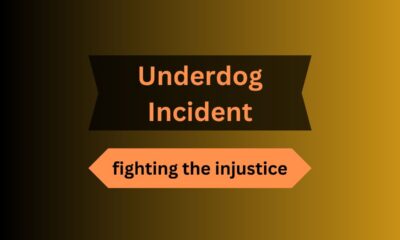Finance
Why You Need Good Insurance

Life is unpredictable. One moment, everything can seem perfectly fine, and the next, you might face an unexpected event that could change everything. That’s where insurance comes in. Insurance provides financial protection against unforeseen circumstances that could
have a serious impact on your life, business or personal finances. Whether it’s a car accident, a medical emergency, or damage to your home, like business debt relief, having adequate insurance can be a lifesaver. In this article, we’ll explore why having the right insurance coverage is essential and how it can contribute to your overall financial health.
Understanding Insurance Basics
Before diving into the importance of insurance, it’s helpful to know what insurance is and how it works.
1. What Is Insurance?
At its core, insurance is a contract between you and an insurance company. You pay a premium, and in return, the insurance company agrees to help cover certain financial losses when specific events occur.
- Types of Insurance: Common types of insurance include health, auto, home, life, and disability insurance. Each serves a different purpose but ultimately aims to protect you from financial hardships.
The Financial Safety Net
Insurance acts as a safety net during difficult times, providing peace of mind when you need it most.
1. Protecting Your Assets
One of the primary reasons to have insurance is to protect your assets. This could mean your home, your car, or even your savings.
- Homeowners Insurance: If your home is damaged due to a fire or natural disaster, homeowners insurance can cover the repair costs. Without it, you could face a massive financial burden.
2. Coverage for Medical Expenses
Health insurance is another crucial type of coverage that can save you from overwhelming medical bills.
- Unexpected Medical Costs: A sudden illness or accident can lead to significant expenses. With health insurance, you can mitigate these costs and focus on recovery instead of worrying about how to pay for treatment.
Peace of Mind
Having adequate insurance provides a sense of security that can reduce anxiety about the future.
1. Reducing Stress
Knowing that you are financially protected can ease worries about what might happen. This peace of mind allows you to focus on living your life rather than constantly stressing about potential risks.
- Planning for the Future: When you’re not burdened by anxiety over financial losses, you can make better plans for your future, whether that involves saving for retirement or investing in your education.
The Consequences of Underinsurance
Not having adequate insurance can lead to dire consequences, especially in a crisis.
1. Financial Ruin
If you’re underinsured or lack certain types of coverage, you may find yourself facing financial ruin after an unexpected event.
- Example: Imagine being in a car accident without enough auto insurance to cover the damages. You could end up responsible for paying out of pocket, leading to significant debt and financial stress.
2. Limited Recovery Options
Without proper insurance, recovering from a loss can be incredibly challenging.
- Struggling to Get Back on Track: If your home is damaged and you lack homeowners insurance, rebuilding or finding a new place to live can become an overwhelming task.
Evaluating Your Insurance Needs
To ensure you have adequate coverage, it’s essential to regularly evaluate your insurance needs.
1. Review Your Policies
Take time to review your existing insurance policies to make sure they meet your current needs.
- Changes in Life Circumstances: Major life changes, such as marriage, having children, or purchasing a new home, can affect your insurance needs. Regularly updating your policies can help ensure you’re adequately covered.
2. Consult with Professionals
Consider talking to an insurance agent or financial advisor to help assess your coverage.
- Understanding Your Options: Professionals can provide insight into the types of coverage that may be beneficial for your situation, helping you make informed decisions.
Tips for Choosing the Right Insurance
Finding the right insurance can feel overwhelming, but there are some strategies to simplify the process.
1. Compare Multiple Quotes
When shopping for insurance, don’t settle for the first quote you receive.
- Research Different Providers: Comparing quotes from multiple insurance companies can help you find the best coverage at the most affordable price.
2. Understand the Fine Print
Before signing up for any policy, read the terms and conditions carefully.
- Know What’s Covered: Understanding what your policy covers and what it doesn’t can prevent unpleasant surprises when you need to make a claim.
Conclusion: Building a Secure Financial Future
Having adequate insurance is a critical component of financial health. It protects your assets, provides peace of mind, and helps you avoid the financial pitfalls that can arise from unexpected events. By taking the time to evaluate your insurance needs, regularly review your policies, and understand your options, you can ensure you’re adequately protected.
Whether you’re dealing with personal loan debt or simply trying to safeguard your future, insurance plays an essential role in your financial stability. Start today by assessing your coverage and making informed choices that will benefit you in the long run. With the right insurance in place, you can build a more secure financial future and focus on what truly matters in life.
Finance
Crypto Facto on FintechAsia.net: The Ultimate Guide for Asian Investors

Cryptocurrencies are replacing traditional securities, and people across the globe are trusting the crypto market and changing their mode of investment. Cryptocurrencies are replacing shares, making a significant space in the investment market. For investment, one needs the right and latest information to make decisions that benefit them the most. In today’s world, where everything is available easily, information is no exception, whether it is related to finance or not. There are several platforms available on the internet that provide useful information through their online portals, helping investors at large to make the right decisions and earn their desired returns. In this post, we will discuss the rise of the crypto market, top cryptocurrencies as per their market capitalization, and why FintechAsia.net is one of the best finance-news platforms for investors, so keep reading.
The Rise Of Crypto Currencies
The rise of cryptocurrencies is evident; it is happening globally and opening new ways of investment for millions of investors. The rise of cryptocurrencies started with the introduction of Bitcoin; after its launch, it didn’t generate much hype, and investors at large were not aware of it. Back in 2017, after nearly a decade of Bitcoin’s launch, it started gathering investor’s attention because of its numerous benefits, such as:
- Independent mechanism
- Limited availability
- Not regulized by the government
- Highly secured technology
These benefits attracted millions of inventors, and they started investing in Bitcoin; after that, the value of one Bitcoin increased substantially beyond the imagination of many experts; it provided an unimaginable return to its early investors and became the talking point worldwide. As of now, Bitcoin touched its highest point by crossing $108,134 per coin. With the success of Bitcoin, several other cryptocurrencies were launched in the market, and some of them became huge successes and provided exceptional returns to their investors.
Top Crypto Currencies
As of writing this post, the top 5 cryptocurrencies as per market capitalization are as follows:
- Bitcoin, with market cap of $2.02 Trillion
- Ethereum, with market cap of $393.17 Billion
- XRP with a market cap of $174.52 Billion
- Tether with a market cap of $139.39 Billion
- Solana with a market cap of $111.65 Billion
These coins are some of the best-performing ones; they hold exceptional value in the market, and millions of investors hold them with the hope of a positive future for crypto.
About FintechAsia.net
FintechAsia.net is a useful platform for crypto users; it shares news related to tech, business, and finance. They have an expert team of writers and provide insightful analysis-based reports on trading and cryptocurrency topics. Even if you are a seasoned investor, this platform has multiple things to offer that can elevate your investment journey. For new beginners, platforms like FintechAsia.net are important to learn useful tips from experts. Articles like investment tips, top securities to invest in, futurist technologies, and more; you can check this and visit the platform to read informative blogs on several topics.
Frequently Asked Questions
Is It Safe To Invest In Crypto?
Yes, it is completely safe to invest in cryptocurrencies; like other securities, they are also an investment mechanism that can grow your money. The important thing is to choose the right one and invest through the legit platforms.
What Are The Most Popular Crypto Investment Platforms?
There are several crypto investment platforms available that are popular worldwide; we are listing down some of them:
- Coinbase
- Bitget
- PrimeXBT
- WOO X
- Binance
You can use any of them; they all are secure platforms for crypto investment, trusted by millions of users worldwide.
Conclusion
Investment is necessary for maintaining wealth and growing our income. With changing times, traditional investment methods are disappearing, and new methods are emerging. Cryptocurrencies are replacing equity shares, debentures, fixed deposits, and more. However, it requires a combination of skills and experience to make worthy investments that increase your net worth. Before starting your investment journey, you need to learn the required skills, take knowledge from experts, and do your market research to find the best available securities. In this process, FintechAsia.net can help you, as it is a news-sharing platform and primarily covers finance and crypto-related topics; you can read their informative articles to boost your investment journey.
Finance
What Are Google WM Max LLC Charges and How to Effectively Manage Them

Credit card is a double-edged sword; it comes with great facilities for making payments and providing interest-free credit for a certain period, but it also has many hidden charges. Companies wait for one mistake from the customers, and these charges are levied on them, creating a significant financial burden on them; one such charge is “Google WM Max LLC.”. In this post, we will discuss this charge and what to do when you see it in your credit card statement.
What is Google WM Max LLC Charge?
Google is the most popular search engine, and it requires no introduction from us; many people use Google as the synonym for internet search, and it becomes obvious to scratch our heads when we see a charge levied on our credit card statement, which includes Google’s name. As we break down this charge, we understand:
- Google: Google
- WM: Warner Media
- Max: HBO Max
This makes this charge related to the subscription of any service of HBO Max, which Warner Media owns.
Reasons Behind Google WM Max LLC Charge
Reasons for the Google WM Max LLC Charge can be many, but the primary ones seem as follows:
Subscription Taken By Users
It is the most obvious reason that you have signed up for the subscription to any HBO Max service and listed your credit card over there, which is creating this charge in your credit card statement.
Third-Party Billing
You may have taken a bundled service or signed up for any service which is directly linked to HBO Max services and that acting as a third-party biller. Now, you are confused seeing this charge in your credit card statement, as you didn’t directly sign up for this service.
Unauthorized Access
Someone else may be using your card and making a bill in your name. Check whether you have given access to your card to anyone or not; if yes, then ask them about this “Google WM Max LLC Charge” If they didn’t sign up for this, then file a complaint with your credit card company and further investigation this charge.
Remedial Action In Case Of Unauthorized Usage
If you have found any unauthorized usage or any suspicious activity with your credit card, you can take these remedial actions to reverse it and make your banking journey safe:
Contact Customer Support And Block Your Credit Card
The first and immediate step should be contacting banking support and asking them to block your credit card. It will stop any further misuage and will help you to focus on remedial actions. If your card has been forged and someone knows the security pin also, then it is a big problem for you, as the security pin works as an identifier and the bank thinks that an authorized person is making payment, tell bank officials to replace your card and provide a new card number and set a new pin.
Take Legal Action
After blocking your credit card, file a legal complaint and mention all the details best to your knowledge; it will help government officials to take appropriate actions and reverse transactions, and it will reduce your loss amount.
Make Payment For Dues
Don’t think that you didn’t spend on your credit card, then why should you pay for it? In reality, your credit cards are directly linked to your credit scores, and non-payment can negatively impact your credit score. Make timely payments, file a legal complaint, and tell the bank to re-issue a credit card with new credentials.
Check For Insurance
Many credit card companies offer in-default insurance options and cover insurance charges in the name of annual and joining fees. Ask your banking company whether they provide this feature or not; if yes, then apply for the claim, and your losses will be covered; if not, then wait for the result of the legal company. Hopefully, you will get your money back.
Meanwhile, keep contacting the banking team to know the latest details and what is required for the early solution.
Conclusion
Hidden charges on credit cards can ruin your credit card experience; it is important to pay caution to every charge and read them carefully to know their relevance; if you observe any unfamiliar charge, then apply the remedial steps mentioned in this post for an efficient solution. In the end, we hope you now understand the meaning of “Google WM Max LLC Charges” and will share this post with everyone to make them aware of this charge and the corrective actions required to be taken in case of unauthorized credit card usage.
Finance
Traceloans: Redefining the Future of Loan Management and Transparency

Financial management is necessary to live a happy and stress-free life. It is vital to fulfil our daily needs and effectively function professionally and personally. Regarding financial management, loans play a crucial role, whereas they work as a booster for many people. In reality, for a large section of the population, loans are nothing less than a trap; the trap of infinite interest and the burden of EMIs is enough to kill their freedom. Many financial institutes and banks preach the benefits of loans and convince everyone to avoid buying in-cash, when loans are easily available. This post will discuss various things related to loan management, things to remember while taking, why you should never take a loan and the concept of Traceloans.
Why Is Loan Management Important?
Loans are driving major economies like the USA, India, China, Russia, and more. They are like economic boosters, and their effective management is necessary for the proper functioning of every sector of the economy. Wherever an economy is slowing, or recession is coming, governments start taking remedial actions by decreasing loan rates, helping people to invest in their businesses and boosting the overall market.
At individual levels, loans are the key to various things, from homes to purchasing luxury things; people take loans for different reasons, making financial institutions an integral part of their lives. Nowadays, loan availability is becoming easier, making more negative than positive impacts. Millions of people purchase luxury things on EMIs, which they can’t buy with their own money. It creates a loop of indebtedness, making a loan a double-edged sword.
What Is Traceloans?
Loan management systems are essential for timely loan repayment and financial freedom. Traceloans is an AI-driven loan tracking mechanism that provides a comprehensive platform that makes loan repayment easy and timely for everyone. We often forget the loan repayment dates, it impacts our credit score, and attracts several penalties from banks. Traceloans mechanism sends you timely reminders, making it easy for everyone to know about instalment dates. It has several benefits; the primary ones are as follows:
Primary Benefits Of Trace Loans
Timely Repayment Of Loan
The primary benefit of Traceloans is the timely repayment of loans; it provides regular reminders, making it convenient for everyone to remember loan dates and emi schedules and make payments on time to their lenders.
Avoid Paying Penalties
No one likes paying late fees; when it comes to loans, the late fees can be more than the original payment, and late repayment of loans attracts huge penalties from banks, making it challenging for people to repay their loans.
Strong Credit Score
With the help of timely payment of their dues, credit scores start improving, and banks and other financial institutions start offering lower interest rates.
Things To Remember While Talking Loans
Loans are not that great as they are considered; it should be avoided as much as possible; still, if you are taking a loan, then remember these things:
Check Interest Rates Of Multiple Banks
Cross-check the interest rates of multiple banks and other financial institutions when taking a loan. The government often offers loans at lower interest rates than the market for specific purposes such as business expansion, setting up a new business, education purposes, for women entrepreneurs, and more. You can take advantage of these schemes also.
Ask For Other Details
Interest is not the only thing to look for; there are various other things to remember and check for while taking a loan, such as:
- Initial fees
- Early repayment charges
- Interest rate type
- Penalties in case of non-payment
- Requirement of securities
Apart from the interest rate, these things play a deciding role in loans.
Look For Flexibility
Flexibility is essential; our financial condition is not certain, and you may be unable to repay your loan in the predetermined period and require more time for repayment. In that case, if the bank charges a high interest rate or other high penalties for the time extension, you should avoid taking a loan from such a bank or negotiate terms to get a better offer.
Why Avoid Taking Loans?
Today, we have normalized taking loans. Nowadays, people don’t hesitate to take loans for small things such as buying phones, bikes, and other unnecessary things, which they don’t need in their lives and will not bring any value because of showcasing attitude, we strive to take loans to own luxurious things and end up being trapped in indebtedness.
That’s why we should always avoid taking loans. It seems easy to repay loans in small EMIs, but we pay huge extra sums or take non-required things in the name of no-cost EMI.
Conclusion
Tracelons is a beneficial technology for loan management; it helps everyone manage their loans easily and redefine the loan market. In this post, we discussed many things related to loans and why you should always avoid taking loans. In the end, we request you share this post with others and share your feedback with us on this loan management post.
-

 Entertainment11 months ago
Entertainment11 months agoBest Kickass Proxy List 2024 – 100% Working to Unblock to Access
-

 Lifestyle11 months ago
Lifestyle11 months agoBanging The Underdog Incident 2022
-

 Entertainment11 months ago
Entertainment11 months agoTamilMV Proxy Sites List 2025 – How to Unblock TamilMV Safely?
-

 Entertainment11 months ago
Entertainment11 months agoTamilRockers Proxy 2025: 20+ Working Links, Mirror Sites & VPN Guide
-

 Fashion9 months ago
Fashion9 months agoTrendy Midi Dresses for Casual Wear: Hair Care Tips Included!
-

 Entertainment11 months ago
Entertainment11 months agoPirate Bay Proxy List 2025: Access The Pirate Bay Safely
-

 Technology8 months ago
Technology8 months agoSSIS 469 – Detailed Guide to Understand The Features and Benefits
-

 Blog9 months ago
Blog9 months agoCy Kass – Family Detail of Alex Wagner and Sam Kass




